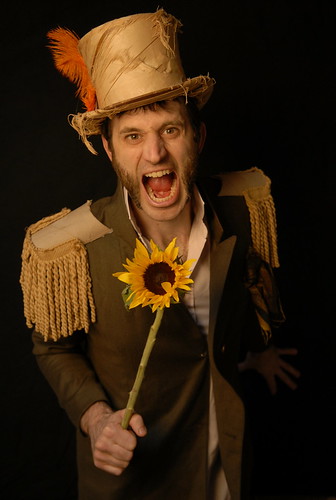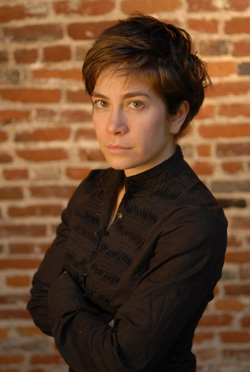 From Rebecca Solnit:
From Rebecca Solnit:"I thought your dance last night was magnificent, entertaining and sometimes quite beautiful and moving (and occasionally hilarious) in itself but also a vehicle to think about damage and art and community in a really interesting way. That is, it was good to watch, but it's still good to think about the next day, as I write. Lots of young artists make work about suffering, but too many of them think that the fact of their suffering or of the existence of suffering is enough. This for me was a piece about what you do with it, what you make of it, and what it means to make art and good art of it.
"As I was saying in a too-noisy room last night, I came into your piece having just talked with Marina M. about a project of hers to focus on 'orphan' objects in a museum collection; I responded as soon as she told me, "California is nothing but an orphanage." That is, this is a place made out of anomalies, discontinuities, self-inventions, and more, of people who have been cut off from family, culture and past in some way, voluntarily or otherwise, and who with that freedom of the uprooted invent. That is only more true of San Francisco, where people come to reinvent themselves as poets, or gender rebels (which made having two of the men in your piece played by women very nice), or Chinese herbalists, or community organizers, or any number of other things, often eccentric or at least non-mainstream things. This is the essence of the place, the thing that makes it matter, and maybe just like everyplace else only more so. I came into the show with all this in the back of my mind, and the show helped me think further about it.
 " The music in this performance was also wonderful: the contemporary pop music provoked a wonderful tension between historical characters put to the test of unfamiliar rhythms while the dancers who played them relaxed into the kind of dancing all of us might do at parties, and then came music more auditorily eerie that asked other things of them. The musical episodes felt like a series of tests or experiments, like the way scientists subject a new strain of plant or a new alloy of metal to tests, going deeper and deeper into how the characters could respond and who responded how to each round of sound as well as to each other responding.
" The music in this performance was also wonderful: the contemporary pop music provoked a wonderful tension between historical characters put to the test of unfamiliar rhythms while the dancers who played them relaxed into the kind of dancing all of us might do at parties, and then came music more auditorily eerie that asked other things of them. The musical episodes felt like a series of tests or experiments, like the way scientists subject a new strain of plant or a new alloy of metal to tests, going deeper and deeper into how the characters could respond and who responded how to each round of sound as well as to each other responding."I was concerned at first when I heard you'd picked Emperor Norton as your subject that the piece would be about charming eccentricity, but I saw something more significant: the question of what one does with suffering and marginalization, what one can do with it, what we can bring together. The historical Norton, who fell to pieces after a financial collapse, was reborn as someone who was to some degree still delusional or mentally ill but who was performing that inability to come to terms with reality as a great festive invitational to join his delightful unreality. [...]
 "And then there were just gorgeous surprises: Duncan's fifty-foot scarf was coiled up onstage from the beginning and I thought we were going to see her death, but when she wore it late in the performance perhaps she was already dead, for she just sat there with the beautiful diaphanous apricot thing streaming the whole diagonal length of the stage, and it was Norton who engaged with it, casting exquisite, disturbing shadows on it as he traveled along its length, the road it made, and then wrapping his head up in it until he became another kind of beast, a muffled creature with a great swollen blind head who lay down and died himself. Wrapped in someone else's legend.....
"And then there were just gorgeous surprises: Duncan's fifty-foot scarf was coiled up onstage from the beginning and I thought we were going to see her death, but when she wore it late in the performance perhaps she was already dead, for she just sat there with the beautiful diaphanous apricot thing streaming the whole diagonal length of the stage, and it was Norton who engaged with it, casting exquisite, disturbing shadows on it as he traveled along its length, the road it made, and then wrapping his head up in it until he became another kind of beast, a muffled creature with a great swollen blind head who lay down and died himself. Wrapped in someone else's legend.....The way that Norton seemed to tire as the performance went on was also really moving; being historically minded, I thought of how Norton would've been an adult when Murietta was hung, and Coit would've been alive, and Duncan was born a couple of years before Norton died when Coit was in her prime; I liked the power of dance to bring all these people together more tightly. Was it an afterlife, as in the wonderful opera by William Kentridge I just saw a month earlier, in which he staged the baroque Death of Ulysses as a reverie spun from the dying Ulysses' hospital bed? Or the way we live with the dead all the time, as you dancers live with Duncan, as I live always with Orwell and Woolf, who live on in the conversations their books provoke in my head and who keep showing up in my work? These figures who accompany us after death, which is one of the powers of art, the art they make and the art others make to keep memory alive. [...]
"The piece left me with lots of ideas and questions—not about it, but about everything else, which is one of the hallmarks of a really good work of art. Ideas and questions and moods and atmospheres….
Congratulations,
Rebecca"


No comments:
Post a Comment